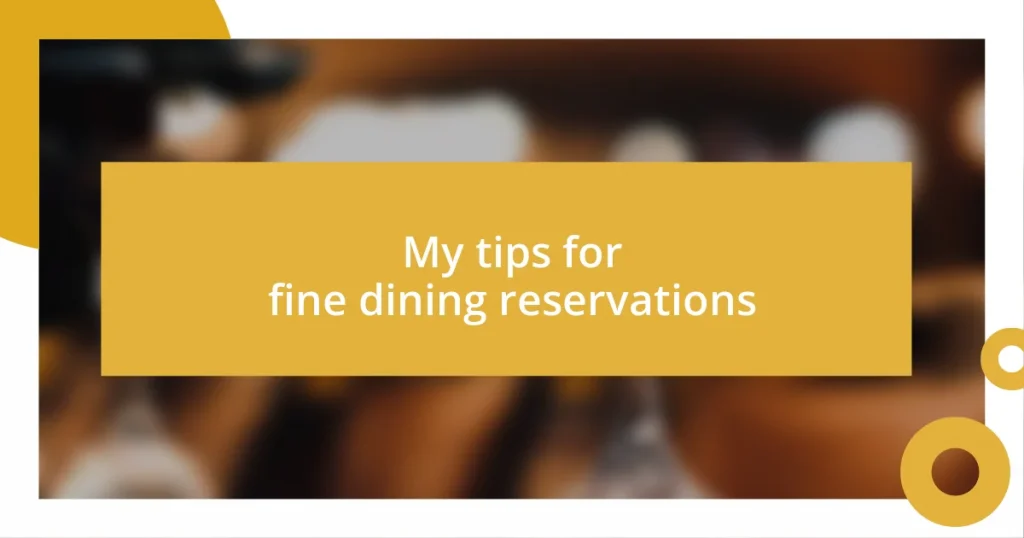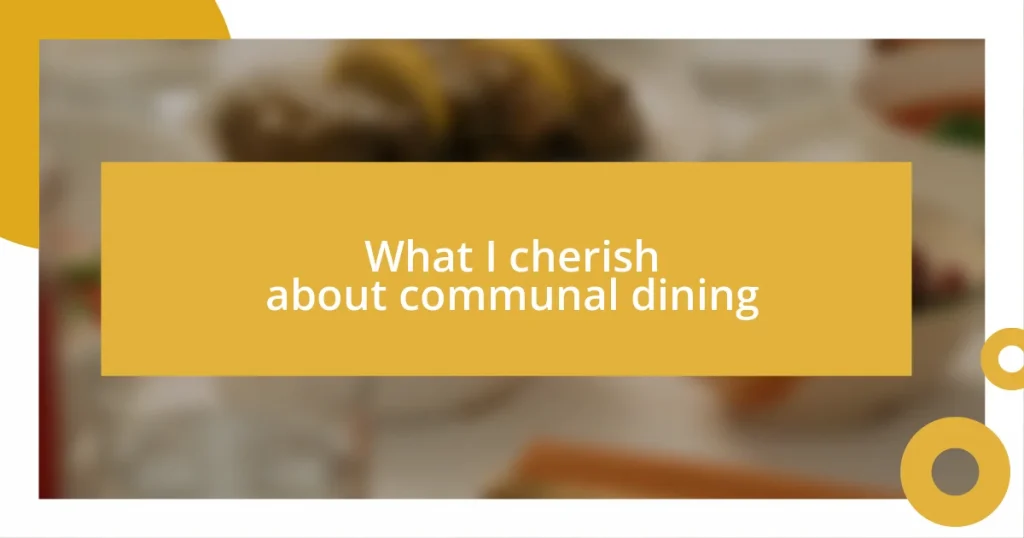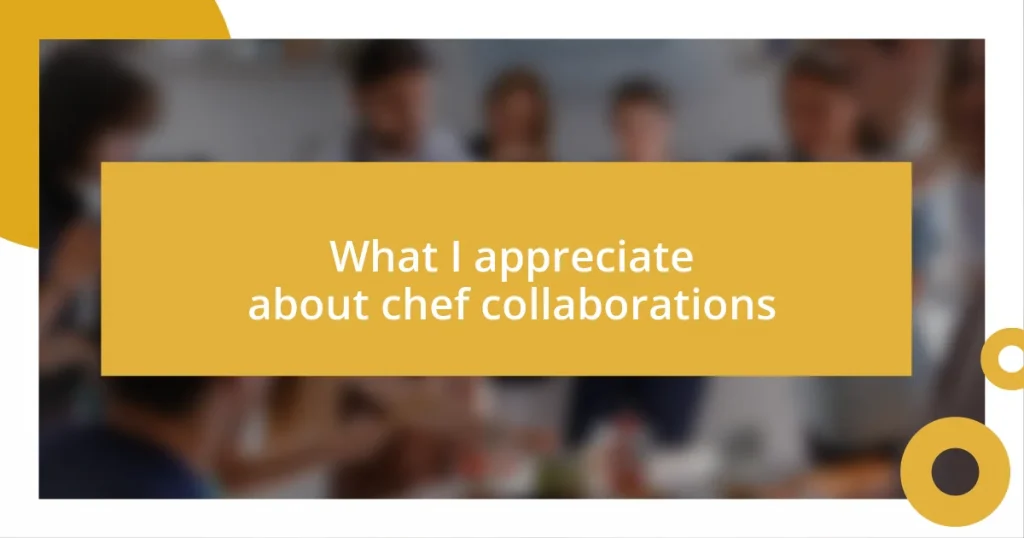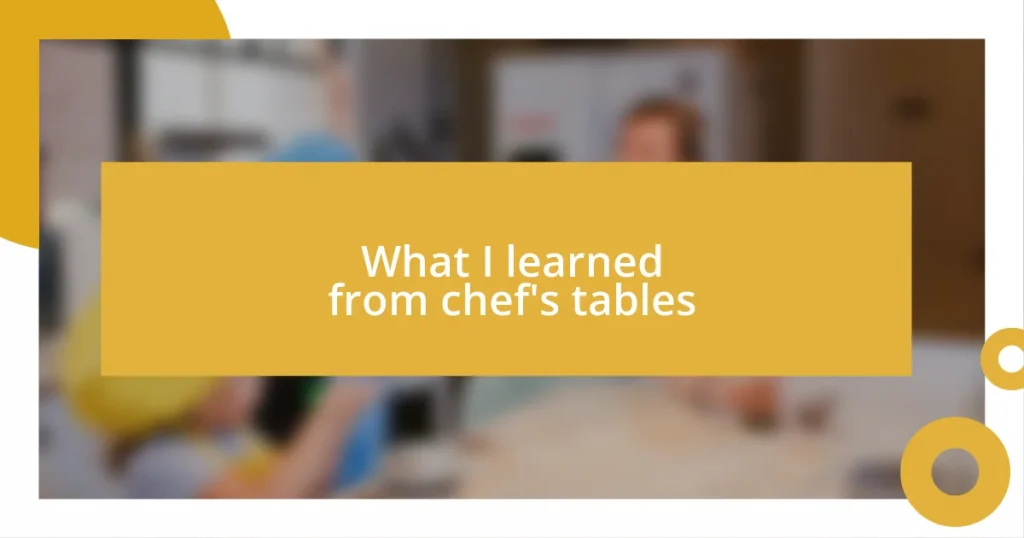Key takeaways:
- Understanding fine dining reservations involves timing, special requests, and the atmosphere, which can enhance the overall dining experience.
- Researching restaurants entails examining cuisine type, ambiance, chef reputation, and menu flexibility to ensure a suitable pick for your tastes.
- Confirming your reservation helps with peace of mind and allows for last-minute inquiries, enriching the dining experience through personalized service.

Understanding fine dining reservations
When I first ventured into fine dining, I remember feeling a mix of excitement and nervousness about making a reservation. I couldn’t shake the thought: What if the restaurant was fully booked? Understanding the nuances of fine dining reservations is crucial. It often involves recognizing peak times, especially for popular venues, and sometimes requires booking weeks in advance to secure that coveted table.
I’ve learned that the importance of timing goes beyond just availability. For example, dining at earlier hours might grant you more attention from the staff, as they are less rushed. Have you ever walked into a restaurant and felt the energy shift during different dining periods? It’s remarkable how the atmosphere can change, and a well-timed reservation can enhance your experience.
Another aspect I’ve discovered is the relationship with the restaurant staff. When you make a reservation, try to express any special requests or occasions you’re celebrating. I once mentioned it was my friend’s birthday, and they surprised us with a complimentary dessert. Don’t underestimate the power of personal touches—these little interactions can set the tone for a memorable dining experience.

Researching the best restaurants
When I’m on the hunt for the best restaurants, my first stop is always online reviews and food blogs. I remember stumbling upon a hidden gem last year that had a small yet passionate following. It wasn’t the glitziest place, but the authentic flavors and personal stories shared by other diners hooked me. I find that platforms like Yelp or TripAdvisor can provide a good sense of a restaurant’s vibe and quality, especially when you read between the lines of the reviews.
Here’s what I suggest focusing on when researching restaurants:
- Cuisine Type: Consider the kind of food you’re in the mood for. Are you craving Italian, French, or something more exotic?
- Ambiance: Look for photos that capture the atmosphere. A cozy setting can elevate your dining experience.
- Chef Reputation: Research the chef’s background. A well-regarded chef often signifies a higher-quality dining experience.
- Special Occasions: Check if the restaurant has experience with celebrations, which can enhance your occasion.
- Menu Flexibility: Explore if they offer tasting menus or accommodate dietary restrictions, as this can impact your enjoyment.
Ultimately, the more I dig into the details, the more excited I become for my dining adventure. I cherish the anticipation of a well-researched dining experience, knowing I’ve chosen a place that resonates with my tastes and preferences.

Making reservations through various channels
Making reservations for fine dining can happen through various channels, and each offers unique advantages. I often turn to online reservation systems like OpenTable, which conveniently lets me select the date, time, and number of guests with just a few clicks. It’s incredibly user-friendly, and I usually receive a confirmation instantly, easing my mind about the process. Have you ever experienced that moment of relief when your reservation is confirmed? It feels like a little victory!
On the other hand, calling the restaurant directly holds its charm, especially when seeking personalized service. I recall calling a quaint bistro to inquire about a special menu for an anniversary dinner. The warmth in the staff’s voice and their willingness to accommodate my request made the reservation process feel more intimate. I believe this direct communication often fosters a deeper connection, leaving the door open for special requests or even recommendations.
Lastly, social media platforms have emerged as popular venues for reservations. I’ve successfully used Instagram to message restaurants, especially trendy spots that attract a younger crowd. The ease of sending a DM with my reservation request has led to quick responses, sometimes even unlocking exclusive offers. While it might not be the traditional route, I’ve found it’s a modern and efficient way to secure a table at bustling hotspots without the stress!
| Reservation Channel | Advantages |
|---|---|
| Online Systems | User-friendly, instant confirmation, and often includes reviews |
| Phone Reservations | Personal touch, opportunity for special requests, and direct communication |
| Social Media | Quick responses, exclusivity, and a modern approach |

Tips for special requests
When it comes to making special requests, I find that clear communication is key. For instance, I once celebrated a friend’s birthday and wanted to surprise her with a custom dessert. I called the restaurant a few days in advance and described my idea. Not only were they thrilled to accommodate, but they also suggested some creative options that added a personal touch to our celebration. Isn’t it amazing how a simple conversation can make an experience feel so much more special?
In my experience, mentioning any dietary restrictions upfront can turn a potentially stressful situation into a comfortable one. I remember dining at a well-known seafood restaurant, where I casually mentioned my shellfish allergy while making the reservation. The manager took the time to discuss alternative options, ensuring my meal would be safe without sacrificing flavor. This level of attentiveness really struck me, and it made me feel valued as a guest. Have you ever felt that kind of care? It truly enhances the overall dining experience.
Lastly, I’ve learned that it’s always a good idea to follow up on special requests close to your reservation date. A couple of weeks ago, I had a table booked at a popular bistro and decided to check in about the birthday decoration I had planned. The staff remembered my request and reassured me that everything would be ready when we arrived. That extra confirmation not only eased my mind but also showed the restaurant’s commitment to giving us a memorable evening. Isn’t it comforting to know that, when you express your needs, dedicated staff are there to make sure everything aligns perfectly?

Confirming your reservation
Once you’ve made your reservation, the next step is to confirm it. I remember a time when I had a table booked at a high-end restaurant for a big anniversary. A day before the event, I called just to double-check. Hearing the friendly voice on the other end confirm our reservation made the excitement build within me. It’s such a simple act, but it adds a layer of reassurance that everything is set for your special evening.
Being proactive with confirmation isn’t just about peace of mind; it also helps the restaurant manage their bookings better. When I checked in, I learned the venue was quite busy that weekend, so I was glad I had called. Isn’t it interesting how a brief conversation can give you a clearer picture of the restaurant’s atmosphere? It certainly made me feel like a valued guest, knowing my reservation wasn’t just another entry on a list.
I’ve also found that confirming the reservation offers an opportunity to ask any last-minute questions. For instance, I once inquired about the dress code while confirming a booking. The staff not only clarified the attire but also recommended the best time to arrive for sunset views from the patio. This kind of information transforms a dining experience from merely good to truly exceptional, wouldn’t you agree?













